|
|
|
IN MEMORIAM
DAVID GERSHATOR
1937-2021
|
In 2018, we asked David, “What
were the high points in your life?” His response
was immediate and off-the-cuff. We’re using his
response as a guide to commemorate his life,
along with photos, history, poetry, and a
tribute from a former student. But first I'd
like to share some condolences and memories from
friends and family.
CONDOLENCES AND MEMORIES
As a young man David believed most of his
extended family, like his father's immediate
family, perished during WW 2, but while doing
research at YIVO he encountered the head
librarian, Dina Abramowicz. When he introduced
himself, she said she knew the name
Gershator—one of her best friends was Ginette
Gershater Gottesman! An unknown relative! And
the adventure of finding relatives took off.
Especially when we received odd phone calls for
ANOTHER David Gershator.
By way of those calls we met TWO David
Gershaters (spelled with an e rather than o):
Cousin David from Texas and Cousin David from
Russia.
David from Russia was making his way as an
immigrant here and we tried to help him a
little. He wrote in a condolence letter: “…for
me he will always be alive. There are just a
few people in the world who were as nice to me
as David.”
David from Texas became a close member of the
family His son, Nicolas Gershater, visited us
from France last year and wrote, “I have
only few memories of David, but they are all
of a cultivated, warm, and intelligent man,
and I feel lucky to have seen him one last
time during the summer before his passing
away. It was especially touching for me to
witness your Shabbat gathering, during which
David managed to sing along with Yonah despite
his complicated health condition. It showed
how strong your family bond was, and how
deeply embedded in his mind these songs and
prayers were."
Gershator and
Gershater reunion, from the right, David
from Texas, David from Russia, Yonah,
Ginette, Abraham (David's father),
Phillis, and David.
|
*******
Matt Paris, man of letters, musician, and
friend, wrote to me re David’s poetry. When Matt
used the word “polymath,” I told him David had
described him that way, but had never
considered himself a polymath, and that he would
have blushed, if he were the blushing type, to
read Matt’s remarks):
"David Gershator brings,
with his polymath genius for apostrophe of the
present, the genre of poetry of the
moment to an apogee rare in either verse or
prose. A traveler over a long life, he has
lived in Israel, Brooklyn, and St . Thomas,
was equally at home in Mexico and Spain.
He savors the world with crackling
vigor and precise language, even offering as
an Israeli-American a lens on everything
from Kabbalah to a contemporary Haggadah,
yet always has a breezy insouciance at the
physical world and miracle of being alive.
Enid Dame thought he was the best poet in
America. Maybe he was. "
Literary lunch: from the
right, poets Frank Murphy, Matt Paris,
Lehman Weichselbaum, and David
|
*******
Tina Blue, David’s beloved Occupational
Therapist in St. Thomas, credits David with
introducing her to Fado and haiku—their sessions
covered a lot of ground!--and providing her with
some belly laughs, too:
"…I recognized from the first time we met
that I was in the presence of a charming,
funny, unique, and idiosyncratic gift from God
that does not come along everyday. I knew I
had better pay attention, stay in the moment,
learn something, and appreciate it. And
then Phillis enters the picture and the room
is filled with not just one but two gifted
bonafide Artists to enjoy! I will always
feel deeply honored and grateful for having
the experience and connection with you BOTH,
Phillis. Both of your energies meshed
perfectly as lovebirds (not in an icky way),
but as matter-of-factly effective life journey
partners, stewards of your community, and
Earth Angels traveling through, spreading your
individual inspiring rich talents and gifts to
all along the way.
…David’s spirit was always bursting
bigger than his earth body and continues to be
a powerful presence minus the baggage. "
*******
Cousin Fred is the cousin who, as a lifeguard on
a NJ beach, saved my life and our son’s—in
utero. Naturally, I am forever indebted, even
though he says, “I’m pretty sure that you would
have been able to regain your footing in the
next few seconds as you weren’t that deep. But
I’m happy to have the legend of my heroics grow
in magnitude.”
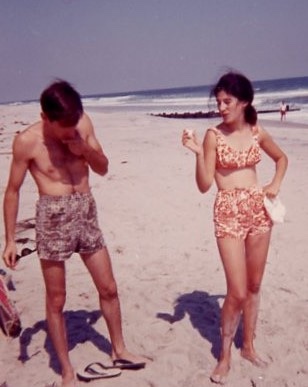 |
Fred sent us this photo from that
fateful day in 1965, when both David and
Phillis (and baby Daniel) battled and
barely survived the undertow.
|
Note: the French prof referred to in Fred's
letter below was Nathan Kranowski. Seeing the
writing on the wall re the market for French
professors, Kranowski told us later, he took on
another profession. He also researched and spoke
publicly about his background during WWII, one
he did not often talk about in his Rutgers'
days. Interview
with Nathan Kranowski.
Fred wrote: “I have always known David
as brilliant, funny, and kind. And will
forever remember him this way. David was
partly responsible for my surviving freshman
year at Rutgers. He helped me with an English
composition that saved my bacon and helped me
pass. I also think his friendship with my
French professor influenced him not to fail
me.
"We are lucky to have
had him in our lives. I remember his last
words to us when we visited in December 2018.
He said, ‘Don't leave.’
"We wish he didn't
have to leave, but we wish him peace in his
new journey, whatever that may be.”
*******
David and I were visiting New York one summer
where we made plans to attend a family reunion
in Vermont. David was showing signs then, in
2014, of problems that were to become
diagnosed later as “atypical Parkinson’s”
and dementia. He was grumpy, and we did what we
could to make the trip pleasant for him. My
brother rented a car and drove us to the
reunion. We all stayed at a nice bed and
breakfast near my cousin’s house, and after the
reunion David and I visited with our old friend,
Joan Davidson, who then drove us to an airport
where we got a quick return flight back to NYC.
Everything went well—in fact, the trip was a
high point for us that year, not only because we
enjoyed a delightful reunion (at which David
actually danced!) but because we met Patricia
Billingsley. She recounts the
serendipitous events of that week:
Remembering David Gershator
In August 2014, my husband, John Merritt, and
I had the great pleasure of meeting David and
Phillis Gershator at the Fitch Hill Inn, a
lovely bed-and-breakfast in Hyde Park,
Vermont. But before I describe that happy
event, let me provide a little background.
At the time, I was researching Federico García
Lorca's relationship with a young Vermont poet
named Philip Cummings. I knew that, in August
1929, Lorca had spent ten days with Cummings
and his family at a lakeside cottage in Eden
Mills, Vermont, just ten miles north of Hyde
Park, and that he'd written several important
poems there. The same cottage is still there
and over time I'd gotten to know the owners,
who had graciously allowed us to spend a week
there during each of the previous two summers.
Sadly, by the summer of 2014, this was no
longer possible. The owners put the cottage on
the market over the winter, and by spring it
was sold to someone I knew nothing about. I
feared we'd never be able to stay there again,
but since I still had more research to do in
the area, I booked a room at the Fitch Hill
Inn for the weekend of August 8th.
A few days before we left our home in western
Massachusetts to head north to Hyde Park, a
friend in Eden Mills invited us to stop and
have lunch with her on our way to the inn.
When we got there, we discovered that our
friend had also invited the new owner of the
cottage, a lovely woman who was fascinated by
its history and wanted to hear all about it.
To my great surprise, after lunch she offered
to let us stay there again the following
summer if we wanted. We headed off to the inn
feeling fortunate indeed, unaware that the
best was yet to come.
At breakfast the next morning we had our first
chance to meet the other guests. I was seated
next to an older, very quiet man and his wife,
whom I later learned were David and Phillis.
To get us all talking, a guest on the other
side of the long, communal table asked each
person to say something about what had brought
them there. When it was her turn, Phillis said
that she and her husband were there to attend
a family reunion, adding that though it was
their first visit to Vermont, her husband
would have much preferred to stay home. David
stayed silent, so I was next in line. For some
reason I said more than I usually do,
explaining that I was there to do research on
a Vermont man who'd been a friend of the
Spanish poet Federico García Lorca.
Phillis looked up in surprise and said, "What
a small world!" When I asked what she meant,
she explained that her husband had translated
some of Lorca's
letters into English when he was a
graduate student at Columbia University. As
she spoke, David brightened considerably and
turned to me, saying he had originally worked
with Lorca's brother Francisco on the
project. I was amazed to hear this and
asked his name. When he replied that he was
David Gershator, I could hardly believe
it. "You're David Gershator?" I exclaimed.
"I've had your book on my bookshelf for years
and consult it all the time! I'm so glad to
meet you!"
As we fell into excited conversation, I asked
David if he realized he was just ten miles
away from the very cottage where Lorca had
stayed in 1929. He said he knew Lorca had
loved Vermont, but had no idea where in the
state he had actually been. So, of course,
John and I asked David and Phillis if they'd
like to see the cottage for themselves. They
loved the idea, and we made plans to drive
there together the following morning.
It was a beautiful, sunny day as we headed
north along the highway. When we arrived at
the cottage, the new owner was happy to see us
and very welcoming. She showed David and
Phillis all around the place, inside and out,
and they seemed delighted to be there. We were
delighted as well, knowing they cared as much
about the cottage's special connection to
Lorca as we did.
After that weekend, John and I marveled at the
sheer coincidence of our meeting. What were
the odds that David, who had never been to
Vermont before and didn't even want to be
there, would end up right beside me at the
breakfast table? And that a friendly guest
would get us all talking, making it possible
to discover such a wonderful connection? It
seemed miraculous then and still does today.
In the years since then, I've exchanged emails
with Phillis from time to time and was very
sad to learn about David's failing health.
Although I met David only once, it was a
momentous and memorable encounter for me. I
feel privileged to have spent time with him,
however briefly, and experienced his lively
mind and generous spirit. I know he will be
greatly missed by all who knew him.
*******
The words, wisdom, and shared experience of my
sisters-in-sorrow: cousin Susan Davidson, friend
Luisa Beers, and sister Carla Dimonstein have
been a comfort. And comforting too were the
kindnesses that came our way: many touching
cards, calls, and emails; spirit-sustaining food
from Laurie Yorr, Miriam Lewin, and Carole
Busch; a spectacular spirit-lifting bouquet from
Mark and Melissa Dimondstein; technical computer
help from Steve Richman; gifts from Maureen
Landrey; donations to good causes in David's
memory from childhood friend Howard Sanger and
cousin Maisie Hodes-Wood; and most of all the
supportive presence of Daniel and Yonah. Our
family is especially grateful to the kind and
patient caregivers helping us during the last
months of David's life: Nancy Digman and Noble
Paquital, and Visiting Nurse Hannah Schwartz at
the very end. Thank you all.
Phillis
|
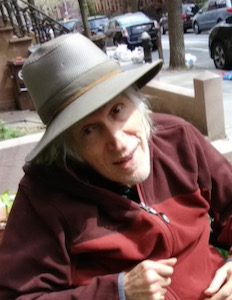 David at 80.
David at 80. |
Note: If anyone reading this never received a
reply to an email sent to our old email
addresses, please know that my access was
suspended Dec. 27, 2021 due to the hijacking of
our email-connected websites. Please resend to
my current email address: pgershator@yahoo.com.
HIGH POINTS
|
David's self
described high points in life:
High
point # 1) "Years 2-8 as
influences."
The land and language of the Near East was
formational, as was his family's history
and WW 2.
David wrote about his early years in a piece of
creative non-fiction: "Rommel and the Magic
Carpet."
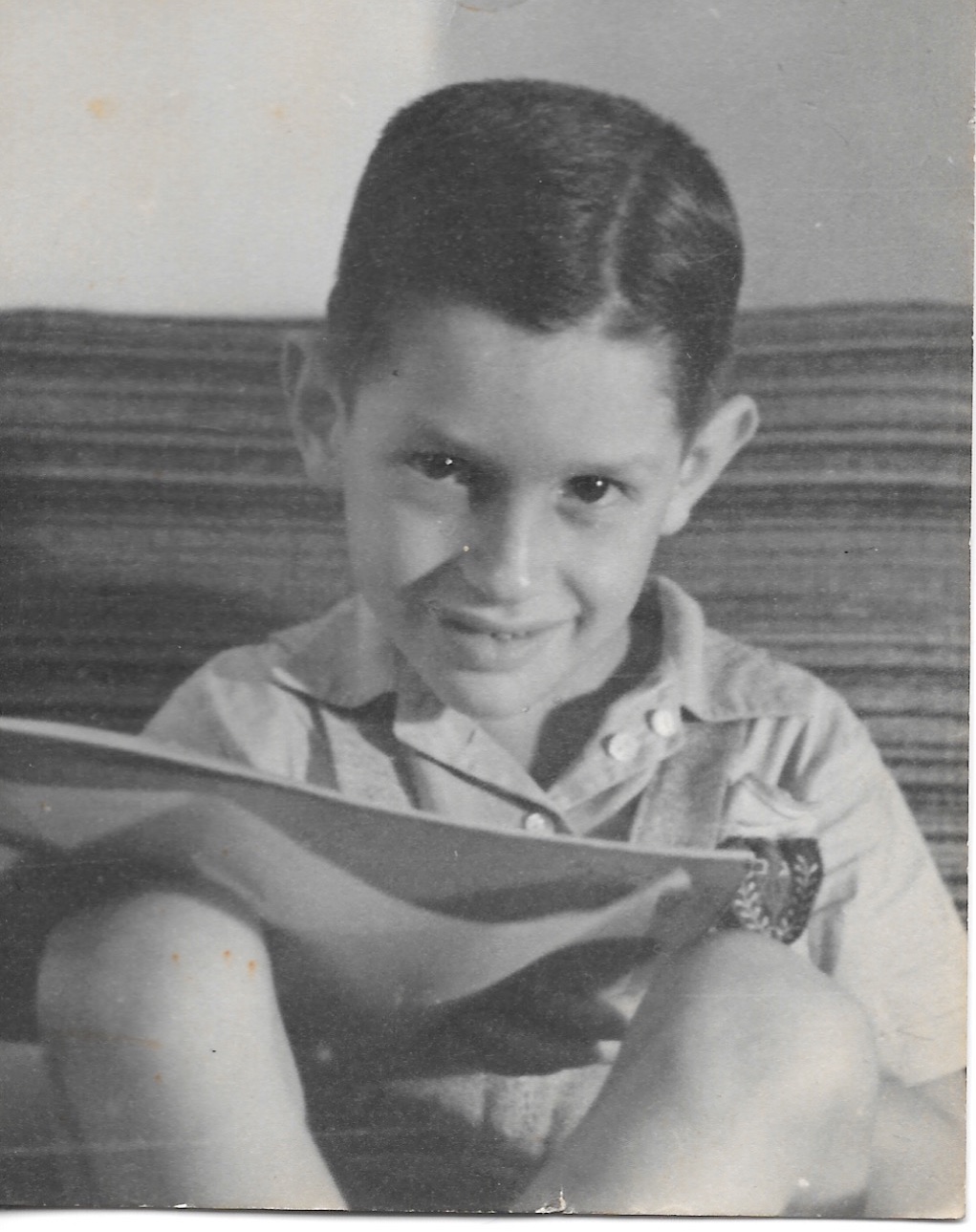
David was knocked down by a bomb as a child in
Haifa. His parents tried to make a game of it,
funny noises and all, but sent him for safety to
cousins at Kibbutz Mishmar haSharon.
He wrote about the event in "The
Other Big Bang" and in this poem:
WW II
Only years later it struck:
that boom in my skull
is the everlasting echo
of a bomb flung out of the blue
whoosh boom!
parents’ joke, family game
the sound of whistle and blast
in target zone oil refinery
one mile from home
from father’s prize
lettuce patch
who wants to bomb
his lettuce patch?
whoosh boom!
goodbye lettuce
from the bay’s forgotten oat fields
the echo of a bomb blasted morning
still goes off
still breathing
a stunned child
rises on all fours
At the age of 8, David and his parents left
British Mandated Palestine on one of the first
ships to cross the Atlantic after the war.
|
#2) "Meeting Phillis on the
ship."
We met on my 19th birthday aboard the Vulcania
bound for Italy. I was on my way to visit family
in Rome. David was on his way to visit Aldo
Vigliarolo, an old school friend, also in Rome.
This wasn’t David’s first trip to Europe so he,
of course, became my guide. A brief romantic
interlude (I thought).
We were married a little over a year later.
The ceremony took place in a judge’s chambers.
Pat Kovner was our witness and took us out for
ice cream sundaes afterwards. Then we took
wedding day pictures. Here’s one:
|
#3) "Touring Italy and
Paris, the Mediterranean, Mexico. Running
up and down the pyramid."
David reaching the top of
Teotihuacan,
Pyramid of the Sun. Summer '59.
He visited Mexico several times after
that.
His book Aztec
Autopsies includes a poem "Teotihuacan"
reprinted on the poetry page,
along with two more from the book.
Here's another:
PORTRAIT
near the Pyramid of the Moon
An old shepherd
compares his face to mine
not believing we're the same age
Is this the same man
I met Aztec years ago?
His hands had once
unearthed pyramids
Now he tends a flock of stones
and souvenirs
offering me silver pendants
and baked faces of clay
one of which I recognize--
my own
|
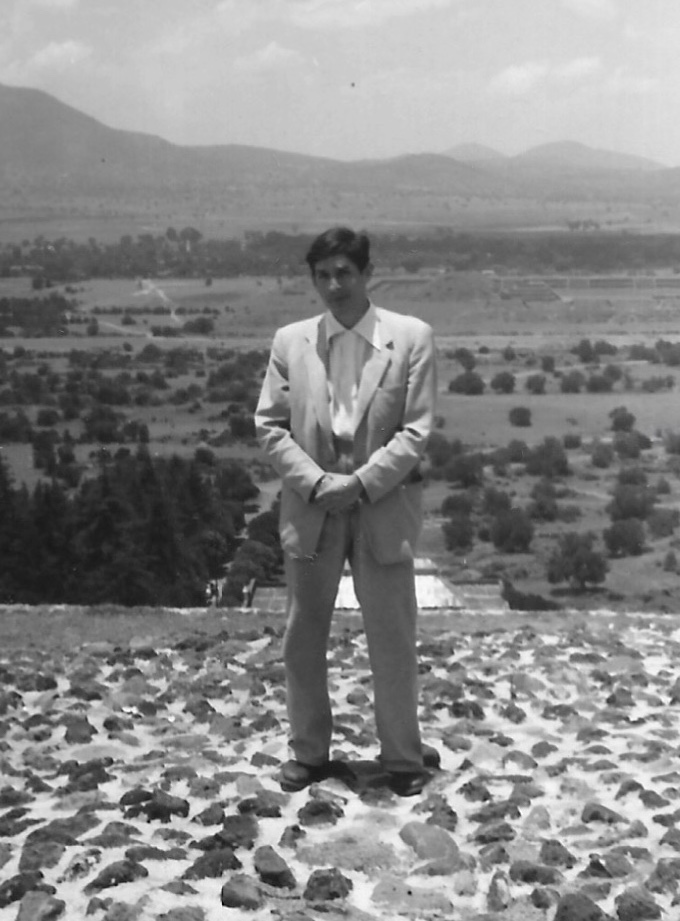 |
|
#4) "Touching daughter’s
cranial hair when she emerged from womb."
Our daughter Yonah was born at
home. The doctor arrived with an oxygen tank on
the back of her motorcycle. She sat in the
corner reading while waiting for the main event.
The book? Barbara Tuchman's gripping The
Guns of August. We were glad she could
tear herself away when the time came.
Our friend Eva Yarmo also chose a home birth,
which gave me courage and confidence.
And David was there helping the whole night.
When I asked, "What is it?" he answered, "A
baby!"
Here we are, two days later, Eva on the
left.
Two years later, our family grew.
Daniel was born.
David was teaching at Rutgers University then.
This photo was taken in 1966, Highland Park,
NJ.
David and I collaborated on many projects over
the years,
but he said our best collaboration was our
children.
#5) "Working on the
Rotterdam--and getting off....
Adventures in India and Katmandu."
David was hired
as a lecturer for a cruise on the Rotterdam,
an offer he couldn’t refuse. It got
complicated, and he disembarked in Mumbai.
Among the ports of call, he also got a taste
of the Polynesian Islands, New Guinea, and
China.
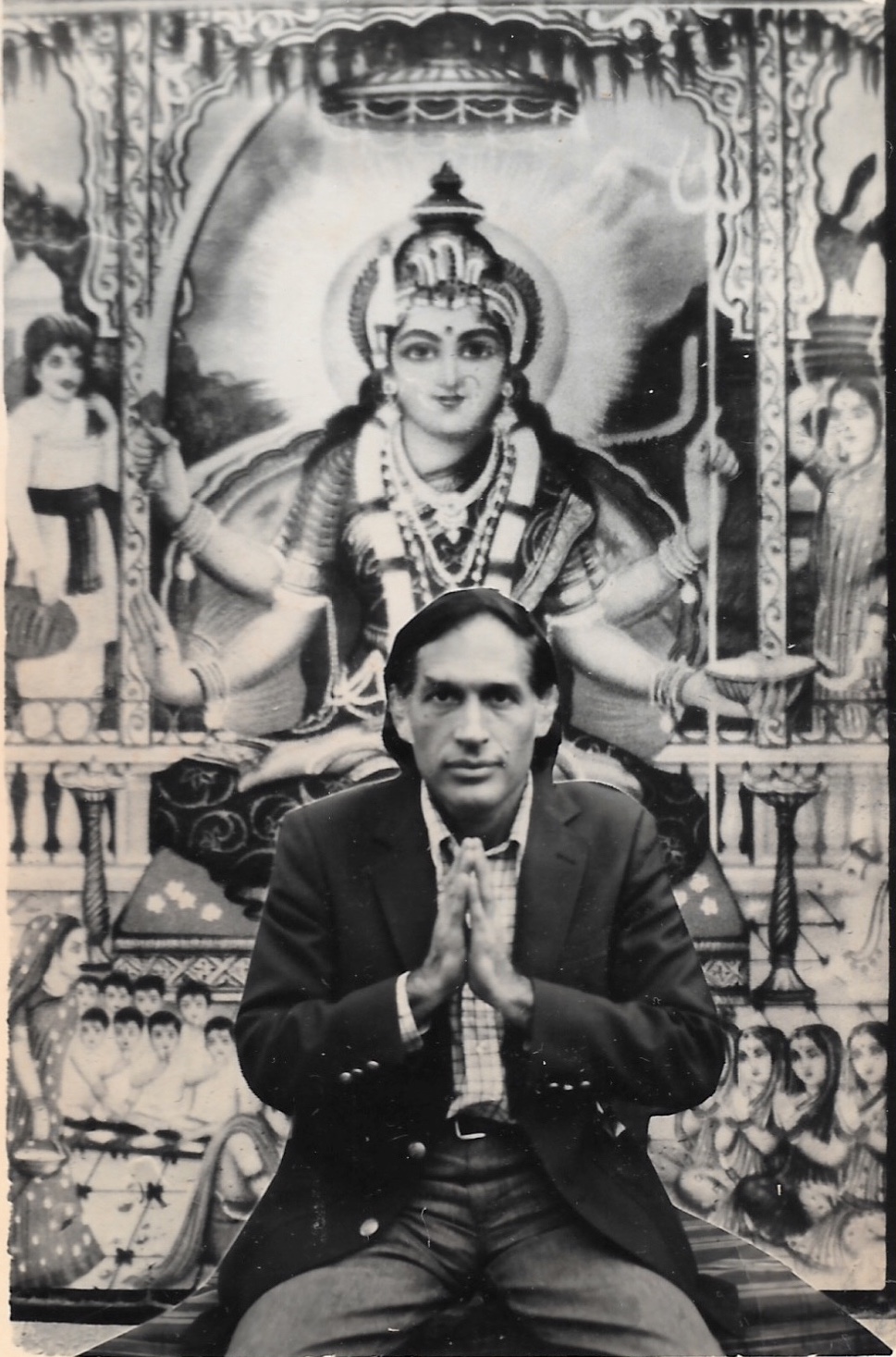 D D |
#6) "Living in St.
Thomas. Waiting for the rain and seeing
rainbows."
We moved to the Virgin
Islands when David was hired to teach
Romance Languages and Literature at the
recently established college in St.
Thomas. He returned to work on the
mainland after 3 years. Twelve years later
we went back to the islands, where David
taught briefly at the college again,
retired, managed property, and made art.
After years of moving from place to place,
we ended up living in the Virgin Islands
for over 35 years.
From our deck: clouds, rain, rainbows--
and sunsets, too.
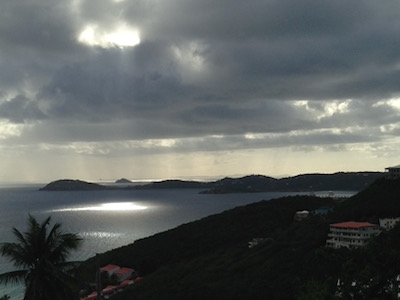
|

|
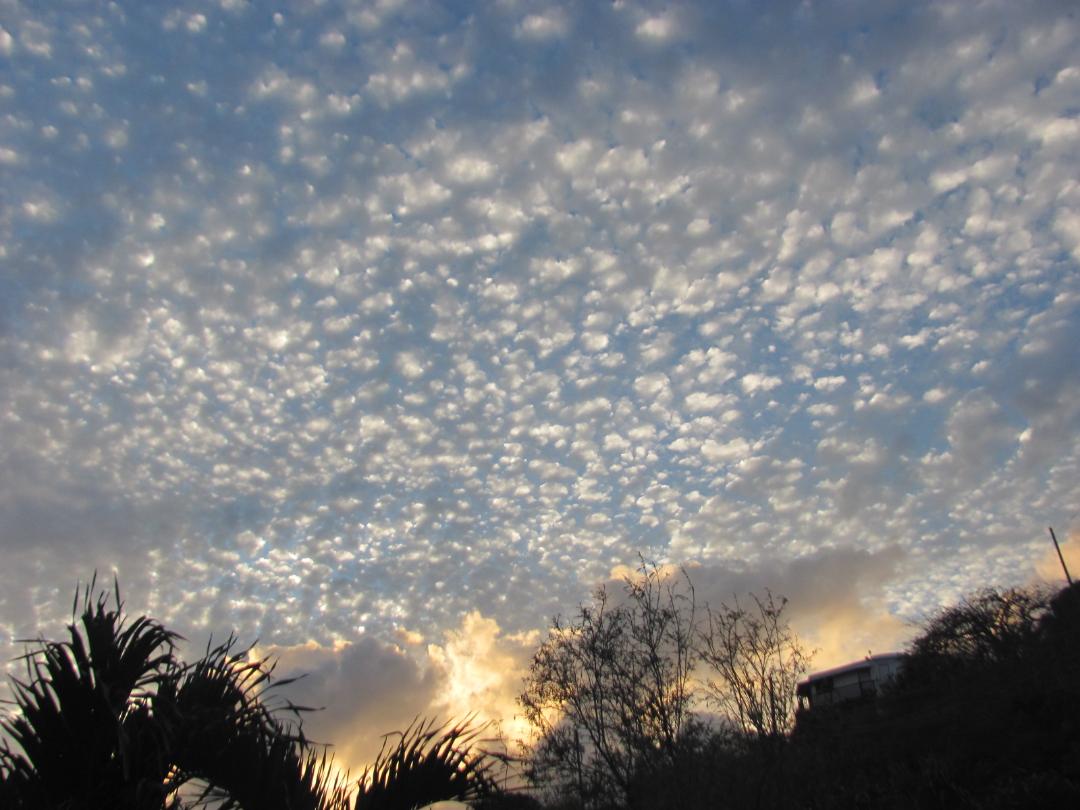
|
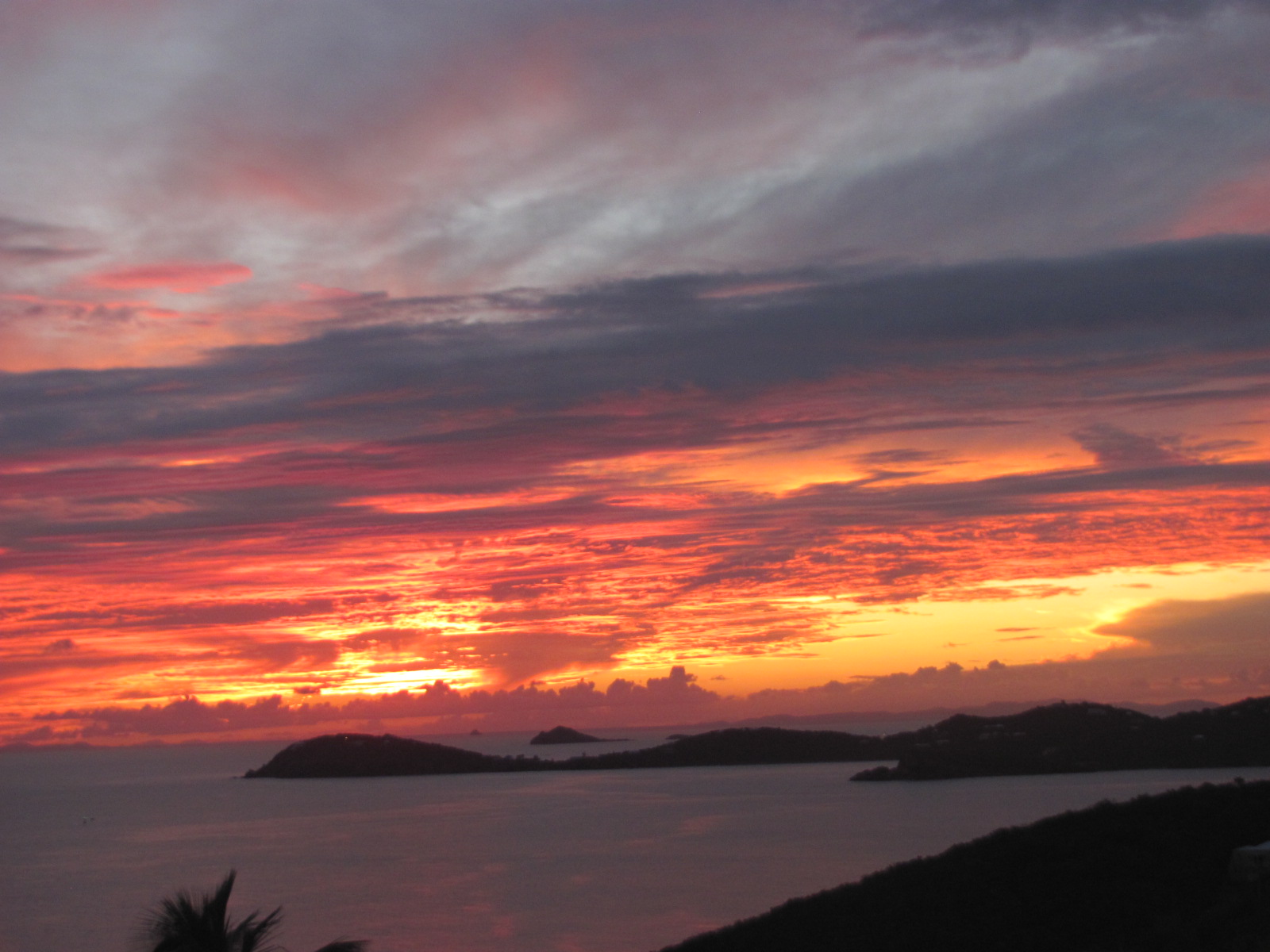
|
There were
good times, despite countless
hurricane warnings and four
devastating,
house-wreaking
storms--Hugo, Marilyn, Irma and Maria.
There were sunset walks, visits from
the kids, dinner parties with the best
of friends....
Hurricane Irma
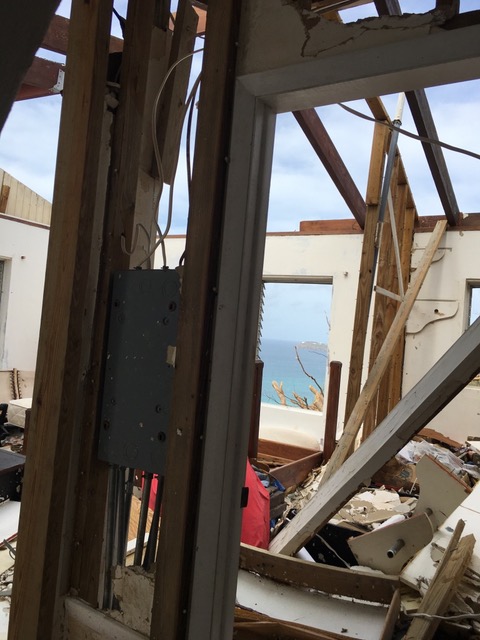
|
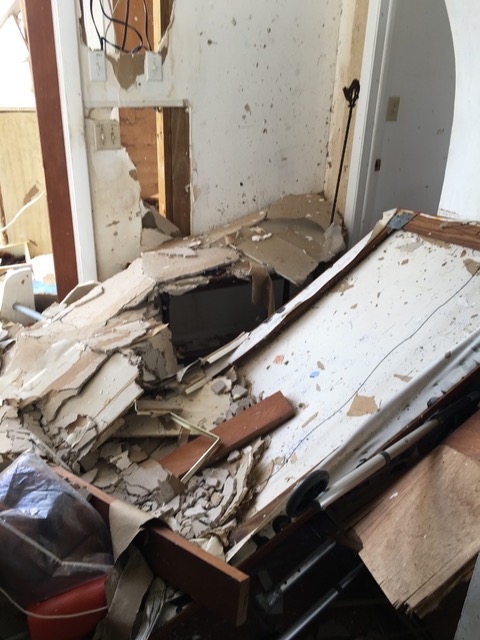
|
Daniel and David
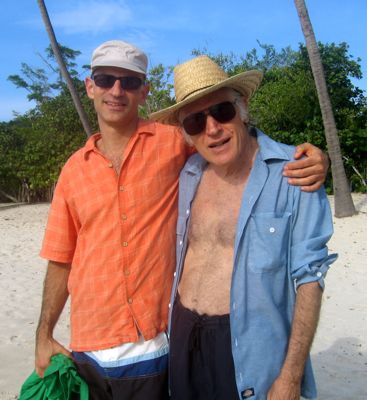
|
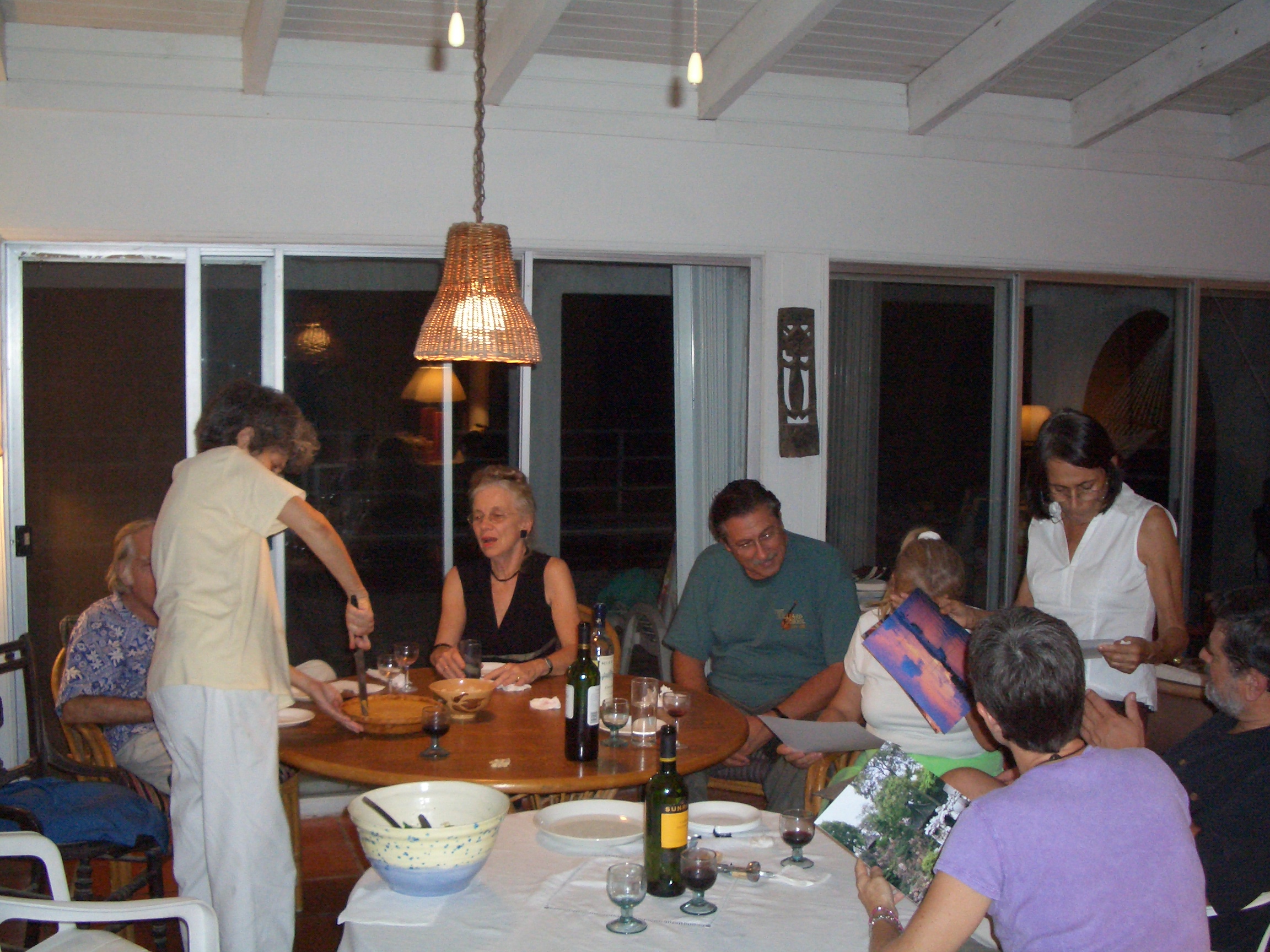
Around the table from the
right: Megan, Carlos, Rodica,
Virginia, John, Ellen, David,
Phillis
|
David's 70th
birthday
Yonah and David
David's Obituary in The
Virgin Islands Daily News,
January 7,
2022
The Gershator family wishes to inform
friends and former students that David
Gershator, a long time resident of St.
Thomas, passed in Brooklyn, NY, December 24.
He was born in Haifa in 1937, coming to the
U.S. at the age of eight, where he became a
Dodger’s fan and flyweight boxer, graduated
from Boys High in Brooklyn, City College
(BA), Columbia University (MA), New York
University (PhD), and studied art at the Art
Students League and Robert Blackburn’s
Printmaking Workshop.
David was a man of many talents. For his
work as a scholar and poet, he received a
National Endowment of the Humanities
literature grant and NY State Creative Arts
Public Service poetry award. His
publications include children’s books,
poetry chapbooks, and translation of
Federico García Lorca’s letters. In St.
Thomas, his paintings and prints were
exhibited at, among other venues, the
Reichhold Center for the Arts and Chase
Manhattan Bank.
When asked about some of the high points in
his life, he said, “Creatively—writing a
good song. Professionally—teaching creative
writing.” As a professor of Literature,
Romance Languages, English and Creative
Writing, he taught at the University of the
Virgin Islands and universities in NY and
NJ, including Rutgers, CUNY’s Seek Program,
and Brooklyn College.
David is survived by his wife Phillis
Gershator, son Daniel Gershator, and
daughter Yonah Gershator. His family
welcomes comments and memories, mailed to
pgershator@yahoo.com, for a commemorative
booklet. For any donations in David’s honor,
please consider the Hebrew Congregation of
St. Thomas and My Brother’s Workshop.
#7) "Creatively--writing a
good song."
David was a natural
musician, a talent he passed on to our
daughter.
More about his music-making on this
page: MUSIC.
I'm not sure why he didn't list
art-making as a high point. I know it
was also a true "zone" creating joy for
him.
David aspired to cartooning even as a
teen.
He carried a sketchbook, both for
drawing and writing, painted in oil and
acrylic before and after retirement, and
took classes in printmaking. In some of
his work he literally got into it, using
his own paint drenched feet in the Sambatyon
series. Aztec
Autopsies contains 17 of his
evocative pen and ink drawings.
|
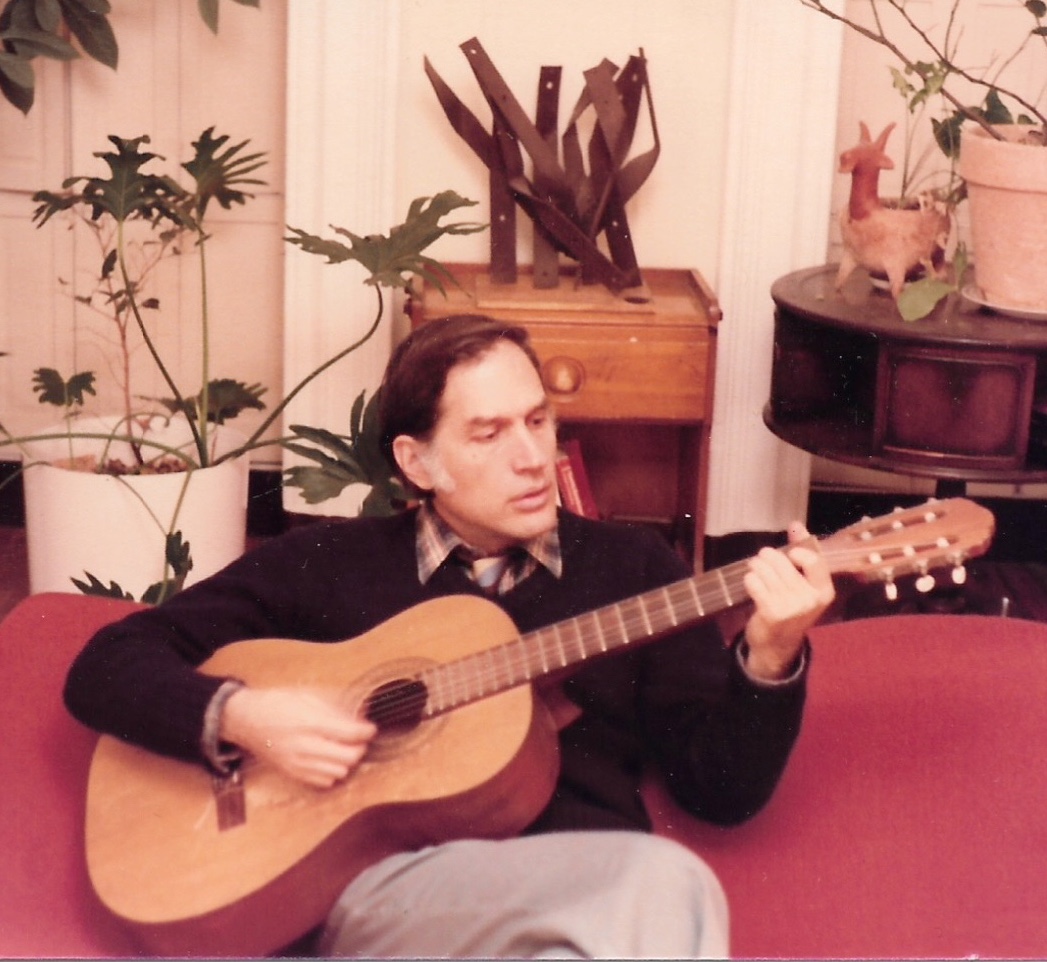
|
#8)
"Professionally--teaching creative
writing."
Starting his professorial career as a
Romance Language instructor, David later
taught English and literature courses. He
taught the first Caribbean literature course
at the University of the Virgin Islands, and
then a creative writing course from which
several exceptionally talented writers
emerged.
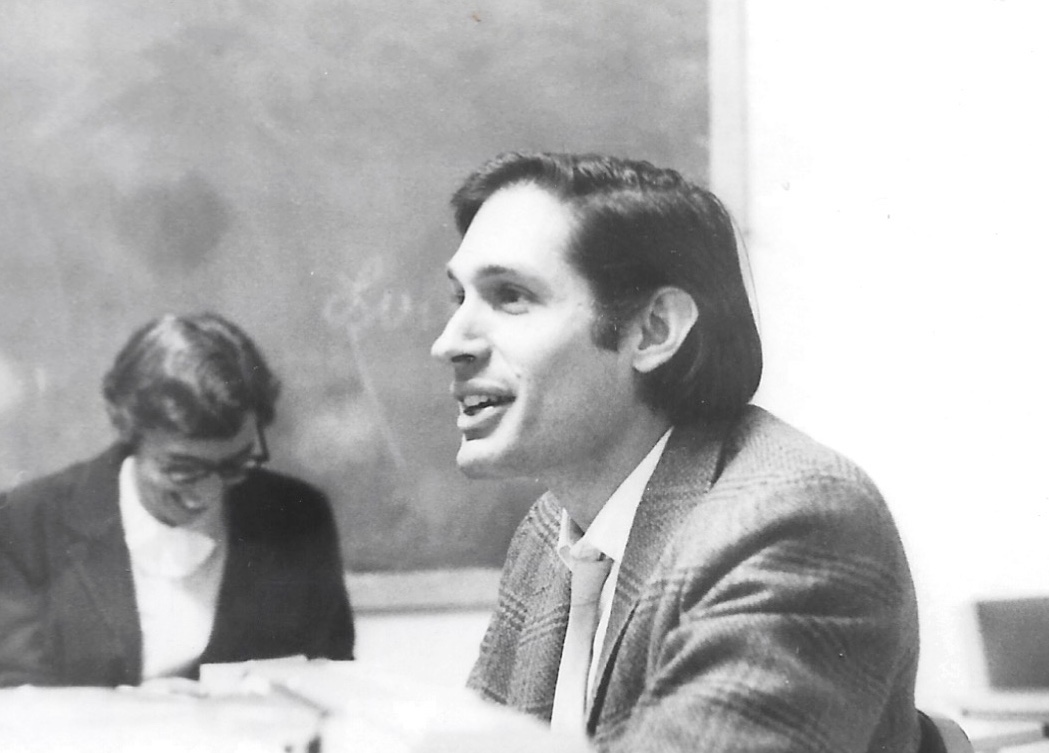
Professor Gershator at work.
|
|
Every teacher has a star pupil. Althea
Romeo-Mark was one of David’s, a
multi-talented writer and an inspiration to
her peers, colleagues, and her own students. David viewed her as earning a place
in the literary history of the Virgin Islands
(see his article: "Poetry
in the Virgin Islands, Past and Present").
She graciously expressed
her appreciation many times for David’s
mentorship, which touched him deeply each
time.
Tribute to Dr. David Gershator,
Educator, Poet, Publisher and Mentor
Dr. David Gershator came into my life by
way of a Caribbean Literature course he taught
at, then, The College of the Virgin Islands
(CVI) around 1968. He challenged his students
to write a poem that defined a “West Indian.”
If I recall correctly, it was not a creative
writing course, but this challenge revealed
the poet that was buried in many of us. We
were like gold, or diamonds waiting to be
discovered. This led him to offer a creative
writing course the next semester. It was
ready-made for us budding writers. And soon
there was a publication, V.I.P (Virgin
Islands Poetry) which featured our
poems. I was a prolific contributor to V.I.P.
In
1971, Dr. Gershator, now my mentor, secured a
scholarship for me to the Bread Loaf Writers’
Conference in Vermont. This experience exposed
me to the wider world of poets and poetry. He
also encouraged me to submit my poems to
journals outside the US Virgin Islands. The
first was The Revista Inter-Americana
Review, an Inter-American University of
Puerto Rico publication. They published my
poems between 1974-1977 (“I Am of Two World,”
“Machrone, “ “A Poem for Island Dwellers,” Vol
IV, Nr.1, “Discovery,” “De Wuk Man” Vol
III, Nr. 4, “Blackbird,” Vol. VI. Nr. 2, “Miss
Benbo,” Vol. VI, Nr.4).
And
even after graduate school at Kent University,
and moving to Liberia, West Africa, to teach
at the University of Liberia, Dr. David
Gershator did not forget me. He contacted me
with the offer to publish a book of my poems.
I was definitely not “out of sight, out of
mind.”
By then, Dr.
Gershator and his wife, Phillis, were
co-editors and members of the poetry co-op in
Manhattan, the Down Town Poets group. They
published, Palaver, my first
full poetry collection in 1978.
We
have always been in touch despite our long
distance (I have been living in Switzerland
for thirty years). I am forever grateful for
his mentoring, and motivation. The desire to
write still flames. I am published in many
countries, and have been invited to take part
in international poetry festivals. My poems
have been translated into German, Italian,
Norwegian, Spanish, and Romanian.
I thank Dr. David Gershator for lighting that
fire. I would not be where I am as a writer
today without his mentoring.
Althea Romeo Mark
Educator, Writer
Lehenmattstrasse 216
4052 Basel
Switzerland
*******
KADDISH
While not religious, David
was steeped in Jewish history and culture.
In his last year he asked Yonah for a
favor: “Say Kaddish for me.” She did,
every night—also lighting candles for a
week-- and more-- of mourning.
At the burial of cousin Susan Davidson’s
husband Bob, on December 31, 2021, even in
the freshness of her own grief, Susan
asked the cantor to say Kaddish for David
as well. Our Brooklyn neighbor, Mosh
Catalan, will be saying Kaddish, too,
daily for 11 months.
David wrote this poem, saying his own (sad
and angry) Kaddish for friend and fellow
poet, Enid Dame, who died before her time,
on December 25, 2003:
ENID
Enid
even if
I’m thousands
of
miles away
i’m at
your funeral
i’m at
your grave
i toss
the handful of dirt
on your
plain pine coffin
i say
the Kaddish
and
walk away dazed
with
your friends
your
brother
your ex
husband
your
mate
and a
lady rabbi
for the
feminist touch
in
touch like your poems
putting
a spin on tradition
for
this Monday burial
before
New Year’s
i’ll
try to write a poem
that
forgives a god
we
don’t believe in
for
giving us
what
you gave
a
re-creation
of the
cut and dry
a
midrash for our times
yitgadal
v’yitkadash
you,
god, who does not hear us
who
gives and takes
you
have taken away our friend
you
have taken away our poet
you
have taken away our Enid
our
Enid, one of a kind
And for his father:
DYING
INSTRUCTIONS
Abba
father
teacher
rabbi
without
answers
you
come back often
and kid
around
leaving
me with a smile
sometimes
I wake up laughing
but
sometimes you’re dead serious
telling
me to die in my sleep
if I
have a choice
the day
you died in your sleep
in your
own bed
was one
of the best
you
confide
better to die not
knowing
than be
born not knowing
it’s
everything in between
all the
disappeared
that
Hitler hung around your neck
all
that knowing
and not
knowing
that
makes closing your eyes
forever
a gift
from some god
the
same god, perhaps,
who
closes his eyes
to
everything
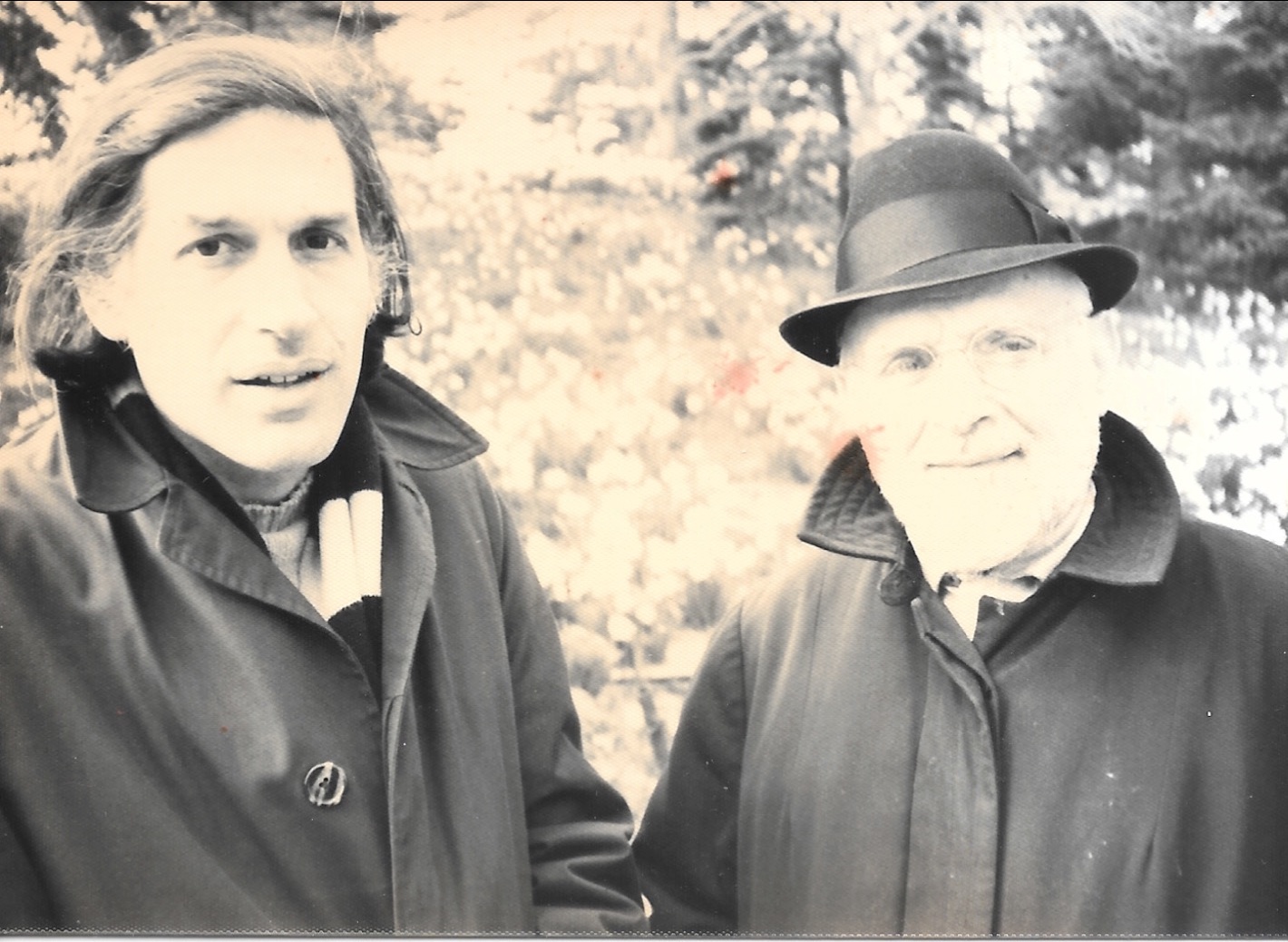
|

|
|
|
|
|